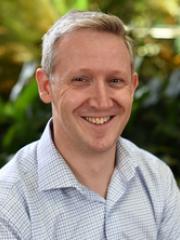Associate Professor James Wells

Associate Professor James Wells leads the Skin cancer immunotherapy group.
Research interests
The laboratory is interested in understanding novel extrinsic and intrinsic factors that regulate CD8 T-cell function in the skin. We are also interested in understanding how immunosuppressive drugs affect naïve and memory CD8 T-cell function in the skin. There are 4 major research themes in the laboratory.
Research projects
- Novel intrinsic pathways of CD8 T-cell regulation in the skin
- The role of CD4/CD8 double-positive T-cells in skin immunity
- The contribution of plasmacytoid dendritic cells to T-cell suppression
- The creation and testing of novel compounds that impact on T-cell function in the skin
Researcher biography
Associate Professor James Wells leads the Novel Cancer Therapeutics Group at Frazer Institute and is the Director of Immunology at the Dermatology Research Centre, University of Queensland. He is also the Vice President of the Molecular and Experimental Pathology Society of Australasia (MEPSA), and a mentee of the Australian Academy of Health and Medical Sciences (AAHMS). He received his PhD in cancer immunotherapy from King's College London, UK, and postdoctoral training at Harvard Medical School, USA, where he received an award for research excellence and was promoted to Faculty as an Instructor. In 2011, he was awarded a prestigious 5-year Perpetual Trustees Fellowship and was appointed as a Group Leader at the University of Queensland's Frazer Institute.
Associate Professor Wells is passionate about delivering effective new treatments to combat cancer through the translation of his research. To achieve this, he collaborates with medicinal chemists, imaging specialists, clinical research teams and industry partners to identify and target pathways and mechanisms that allow cancer cells to grow within the body.
In collaboration with the Queensland Emory Drug Discovery Initiative, he has recently developed and patented a drug (Q2361) designed to prevent and treat skin cancer in immune-suppressed solid organ transplant recipients. Q2361 is a first-in-class drug candidate capable of reactivating anti-tumour CD8 T cells in the skin of organ transplant recipients on the immunosuppressive drugs Tacrolimus (FK506), Sirolimus (rapamycin), and Everolimus. He is currently striving to bring Q2361 across the 'valley of death' and into clinical trials.
James would like to thank the granting bodies and philanthropic partnerships that make his goal of delivering new and effective cancer drugs possible.
